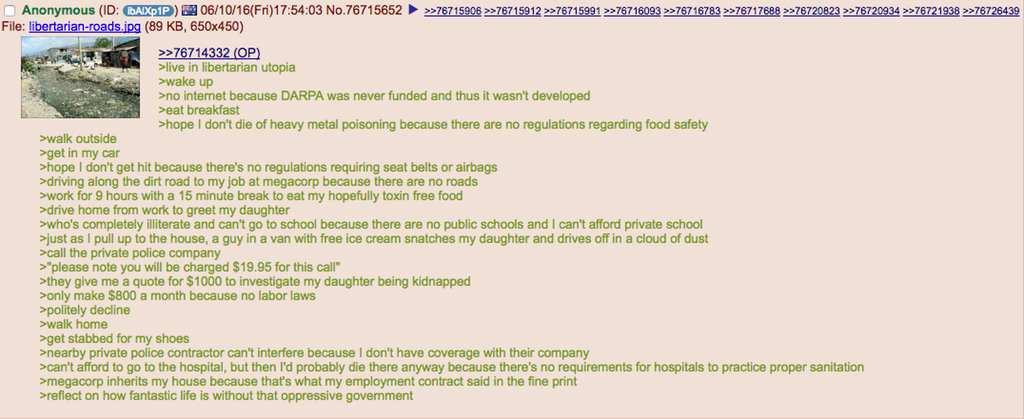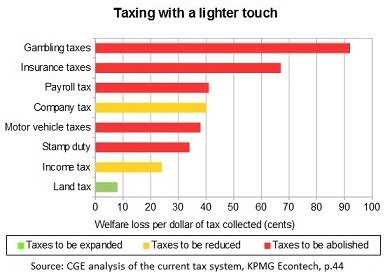I’ve seen a few posts on this site categorising the pirate party as left libertarian, and am curious as to what libertarian policies you support. Do you guys believe in the non aggression principle and in creating a more voluntary society?
Virtually all of the policies are philosophically libertarian, but derived from the older, left-wing tradition rather than the post-1970s, American version.
We want to protect free speech, privacy, and self-ownership, delete the marriage act, overturn IP monopolies, end the war on drugs, shift out of imperial entanglements, encourage alternative currencies, and pivot towards more voluntary taxes, such as taxes on land ownership.

Whenever discussion about libertarianism is raised, I pretty much jump to this.
I don’t like the term because, well, it’s pretty much American. And it’s pretty synonymous with Birthers, Truthers, Guns and Bitcoin. And except for the Bitcoin, not what I’m about.
Yes the definition is something different, technically… Sort of… If you interpret it a specific way. But in every ones mind when you say your a Libertarian, they think its 50/50 chance you have a survival bunker and basically are John Goodman in 10 Cloverfield Lane. The plus side of Libertarians, (and I know quite a few of the real Bunker dweller, bring on the end of the world, society crumbling types) is they are to a stereotype excessively polite, well mannered, educated. Oh and they are white. And have automatic rifles.

Essentially, at its core, Libertarianism is egalitarian. No free rides, no special rules for anyone. This is awesome. I’m all about this. I hate corruption and cronyism. And its not until you work in big corporate or politics that you realise how much of the bad decisions and wasted potential actually directly comes from this. Libertarianism aims to solve exactly this problem. A noble and just cause.
But the decks are already stacked. In case you hadnt noticed. Despite all the advances in equality, women still have it tough. Yeah race is an issue. But not actually as big a deal as it once was - but still its a stacked deck. Making the playing field fair, just entrenches existing power. Baby Boomers still own all the houses.
Libtertarianism, IMO does not offer a roadmap to become the society that is required for it to be able to adopt Libertarianism. It leaves it up to the individual. A bit like our election campaign. And individuals get stomped on by organised, disciplined managed teams/groups/coalitions. Have a look at our campaign results if you need some data points for this argument. Its not a fair fight. The whole point of teams, groups, organisations, companies, governments is to make it UNFAIR.
The pinnacle of this delusion of Libertarianism is the Pro Gun lobby. They think government wants to take their guns so they cant stop the government taking over their lives. So they need assualt rifles, because when they say home defense, they mean against the police and army. But its bringing an assualt rifle to a war of ideas. Your just so mentally underequipped you dont even know whats going on. You lost before you even turned the safety off. Your fanstasy last stand of freedom of individual against the tyrrany of oppression by going down in a blaze of glory and inspiring the masses into an armed resistance to bring about a just society where everyone just looks after their own never happens. No one cares. The government doesn’t care about your guns. They care about news cycles and voter demographics and polls.
Libertarianism is a noble aspiration. It is also naive. It is the Bernie Sanders. Brilliant, qualified, smart, almost always absolutely the best most informed opinion. But not quite good enough playing in a game that has no tolerance for failure. I support a lot of Libtertarian ideals, but I would never call myself a Libertarian.
Now, on plus side - these views are personal, and in no way reflective of the party.

Before I was in the Pirate Party I was part of the Anarchist movement an sometimes I called myself a libertarian socialist, depending on who I wanted to annoy (nothing pisses off state socialists like taking their word and putting libertarian in front of it).
I have a fairly similar view to Noam Chomsky on right wing libertarianism, which he explains better than I can.
Libertarian was meant to be a nicer word than “Anarchist”, but I think Anarchist has borne itself out as being kinder and actually more of a realistic ideology, even the “let’s blow shit up” kind.
Here’s the thing: Dogmatic people solve problems poorly. If the only tool in your toolchest is “let’s solve this with Anarchsm” (or communism, or capitalism), you’ll probably end up with a world as crappy as the one we live in today. The way I like to phrase it is: I’m aesthetically an Anarchist (and I hover between the types), but practically I want to solve problems well, so I’ll happily drop the dogma for a good solution.
What this means in practise is: Try and solve a problem in a peer-to-peer way. If that doesn’t work, go centralised, and see if you can solve a meta-problem in a peer-to-peer way, or do it in a way that the citizens end up empowered, or in a way where it’s very hard to centralise the power, even though the system itself may be centralised.
Anarchism – the idea that power should be controlled by the citizens in a direct sense – is an idea which is uniquely suited to the information age, because a lot of the scalability problems of the past end up being solved rather elegantly with technology. However, it still doesn’t solve everything, and it’s best to not be dogmatic about it.
Thanks for the replies, It seems that left libertarians have more in common with progressives than with libertarians. As progressives have the same support for civil liberties (however you guys place more importance on free speech, digital currencies and IP reform), and also believe that government has a large role to play in providing welfare to the community. Correct me if I’m wrong, but a basic income policy would greatly increase the size of government spending on welfare (even with the cost savings of less bureaucracy) , so a left libertarian government would have no choice but to be a high taxing, high spending, large government. And something that a modern day libertarian would be 100% against, even though economists like Hayek and Friedman have been in favour of basic income/negative income tax.
As Gandhi said, a truly non violent society would be an anarchist society. One that fully supported the non aggression rule, that the use of force against others is wrong. I don’t support anarchy or believe that the non aggression rule should be followed unthinkingly, but it seems to me that libertarians follow the non aggression rule more than left libertarians. Left libertarians still believe that the use of force is justified when it comes to economic matters, whereas libertarians see wealth redistribution as authoritarian and strongly against individual freedoms. I don’t see how left libertarians can be against authoritarianism, and support a large welfare state. From a libertarian perspective it’s the opposite of a kind and caring society. Rather than people supporting each other willingly, by choosing to give their money to charitable causes, their choice is taken away and the state decides how their money will be divied up (greatly increasing its power in the process).
Also rather than living in a voluntary society, left libertarians like Chomsky want to live in a more democratised society, which they see as somehow being more free. But how does more democracy equate to more freedom? hierarchies are abolished, but instead of having a boss tell you what to do, now the majority decides for you, replacing the boss and leaving you no freer than before. Also a lot of Chomsky’s ideas like worker run businesses can exist under capitalism, even communal societies can exist under capitalism. So the hate of capitalism as a system is unwarranted.
As left libertarians, you guys are more community minded than right libertarians, so things like building voluntary safety nets (which libertarians strongly support but don’t really care enough to do anything about) should be right up your alley. Are you guys working on something like that? And why not support that instead of increasing the size of the welfare state (and government power) by supporting basic income.
I would have to disagree here on the basis that ‘progressive’ is significantly more vague than ‘libertarian’. In my view, the Pirate Party advocates the protection of the economic, social, cultural, political and civil ‘twin covenant’ rights and freedoms and recognises the positive role government can have in remedying inequality, while ultimately acknowledging the importance of the empowerment of the individual. In our approach government exists to provide what the free market cannot.
There is a flaw in your premise that basic income requires an increase in taxation, spending and government size. Taxes and spending do not need to be increased if expenditure is redirected or cut in other areas, and our policy is very clearly aimed at reducing existing inefficiencies within government. Our tax and welfare provides significant tax cuts for low-income earners, with moderate tax cuts for everyone else. It also cuts company taxes, but abolishes several subsidies.
There is a point where evidence clashes with ideology. Left-libertarians recognise the need for a welfare system, and certainly the Pirate Party does with its views on empowerment — our policies are very much about giving people opportunities to better themselves. Evidence indicates that the fairest and most effective way to do this is through a negative income tax.
As with any label, ‘left-libertarian’ is helpful but not definitive. As a general rule we are left-libertarian, as varied a camp as that is. I think this is why we tend not to use it formally. At least with ‘Pirate’ we get a chance to define it to mean whatever we want it to mean. For example:
We don’t.
See my first paragraph.
I personally do not agree with the view that the state is different from the people; that the government is markedly different from the governed. Representative democracy does give people the choice — and the Pirate Party’s policy set transparently tells people how we propose to divide up the revenue. If people like our plan, they can vote for us. If they do not, they have many other options.
Consider my varied camp comment, then consider my comment about protecting rights and freedoms. Our policies maintain at the very least an implied commitment to the rule of law, and a belief that through adequate legal and constitutional protections the rights of all can be preserved. We are also very much in favour of economic freedoms and free trade, so we’re not as radical as perhaps many other left-libertarians are (yay capitalism).
Leaving aside what I said earlier about not actually increasing the size of the welfare state (except, perhaps, in expenditure, because the policy is aimed at reducing poverty traps) and government power, what voluntary safety nets do you have in mind?
Hopefully you realise that a lot of stuff in “libertarian utopia” quote is a nonsense, especially if it is supposed to be an “average” person. e.g. if the average person only makes $800 a month, then an investigation company that charges $1,000 will likely have very few customers and go broke.
Similarly, food company with poor health standards would quickly lose customers to one that is better (it is generally not a good policy to kill your customers). Or with the car example – why did they buy one without seat belts and airbags – and if they couldn’t afford the more expensive model, then how would making them mandatory change things; it would mean no car instead of an unsafe one.
There are other things, like the fact that schools and roads don’t cost anything less because the government pays for them – the resources to fund them still needs to come from people, just via taxes instead of directly.
The whole thing only makes sense if it is for a poor person, in which case most moderate libertarian type parties (such as Pirate Party, Liberal Democrats, etc in Australia) support welfare, often through something like a negative income tax.
In terms of naming, with the heritage of Australia, often “classical liberal” is a better term (and not as radical as the American version), plus also that most political parties are deliberately fairly moderate (even if individual members are more anarchist/extreme).
The way I usually look at it is a mix of the progressive social policies of the left (Labor/Greens) and the trade/market-based economic sensibilities of the right (Coalition).
Disclaimer: I am a member of the Liberal Democrats (although I certainly have a strong like for the Pirate Party. (The PP is more left than the LDP, however the LDP is much larger.)
That’s still debatable. There’s not been large enough test runs of it in the world to say one way or the other. Some might say it’s a basic maths problem “you’ve removed the bureaucracy limited payouts and replaced it with blanket payouts, if the blanket payouts are more than the bureaucracy limited payouts than it costs more” but it’s not that simple because there’s the factors of the success rate of the system of people exiting welfare dependence and the wider economic impacts of the welfare population.
My take is that bureaucracy welfare is inefficient, encourages corruption, is more likely to have worse outcomes and as a result of all those things hampers the economy
https://pirateparty.org.au/wiki/Policies/Tax_and_Welfare
Reading your tax and welfare policies, I like a lot of them, especially the abolishment of payroll and gambling taxes, introducing a land tax and cutting company tax. Especially this part.
Pirate Party Australia believes combined tax and spending across all layers of government should be kept below 25 per cent of GDP. Deficit reduction should be accomplished through economic reform rather than higher taxes, and no reform is more important than the removal of inefficient, investment-stifling and regressive taxes. Pirate Party Australia seeks to bring about a tax system worthy of the digital age and a smaller, smarter government which frees its citizens to truly reach for life and liberty.
That’s completely aligned with what libertarians want to achieve. And you’re cutting a lot of taxes. But I don’t see how the numbers add up. From your tax policy, you want to introduce negative income tax and also match current welfare payments (so people aren’t worse off). This means that the current welfare spend of approx $126 Billion will remain the same (Minus 3 to 5 billion in money saved by reducing bureaucracy) Plus everyone earning under $37,500 which a guesstimate is 30% of the population will also have their incomes topped up, leading to (another guesstimate) at least 250 Billion in welfare spending in total. Do you have more detailed figures?

From this figure, it looks like no taxes are being increased to pay for this additional welfare (since land tax is going to the states). And Income tax has decreased, which seems pretty unrealistic given that your flat tax rate is 37.5%. If you have funded the additional welfare spend by an increase from revenues from income tax, then this seems to contradict your figures and this
A shift to negative income tax will reduce income tax receipts by around $30 billion per year, with the bulk of benefit flowing to low income earners. Pirate Party Australia would restore some revenue through abolition of tax breaks applied to negative gearing and capital gains
From reading more of your policies, it seems you do actually have more in common with libertarians than progressives, especially the support for free trade and capitalism. And negative income tax is definitely something I would support, if the costs could be managed and it didn’t lead to a tax and spend above 25% of GDP. But your current policies point to either massive deficits, or a tax and spend above 25% of GDP. And I think a 37.5% flat income tax rate is too high, and massively reduces the incentive to work.
Something that provides a safety net to the community, but works completely differently to the current welfare system and is completely voluntary, like fraternal societies in the old days, where people would give a proportion of their income to the society and in return be looked after in times of hardship. Or not even income but offer whatever free time, skills or goods they have to local community members. There’s probably a million different solutions that could work. It doesn’t even have to be local community based. For example freelancers/artists/musicians who have fluctuating incomes, an app which they could join communities of people in a similar situation and have them pool resources in order to give a more stable income would be desirable.
Also the current welfare system doesn’t tap into the skills of the current unemployed population. People who are skilled and unemployed and who can produce but don’t have a job. Ways of bringing people in the same situations who have complimentary skill sets so they can create their own jobs (as there is no limit to the amount of wealth that can be created - a lack of a job shouldn’t be a barrier to production).
I’m not advocating that voluntary safety nets replace the current system of welfare, but that they augment it , hopefully with the long term aim that they can eventually become robust enough to replace government welfare, but even if that never happens, they will have positive benefits by themselves.
But the solution is going to involve technology and if its open source even better. You guys probably have enough technical skills among members to try building several solutions. And if you base your welfare plan on 50% voluntary safetynets, 50% negative income tax, you can probably get costs down to the point where you meet your tax/spend 25% of GDP goal.